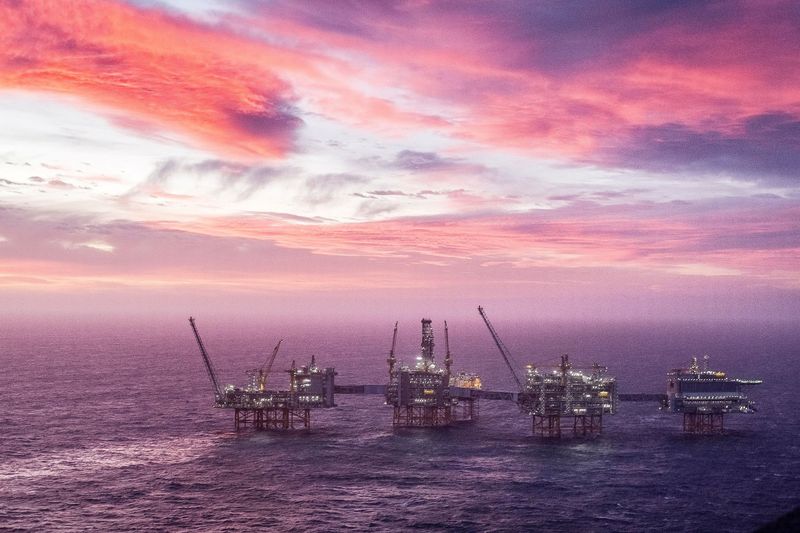By Nerijus Adomaitis
OSLO (Reuters) - As Europe searches the world for oil to replace Russian barrels, one oilfield closer to home is helping plug the gap.
Norway's Equinor is sending crude from the giant Johan Sverdrup field in the North Sea to the European market instead of Asia, where it exported about 100 million barrels last year.
At the same time, Russia is finding demand for the crude Europe is pulling back from in Asia, with China and India boosting their intake attracted by deep discounts.
In Europe Norwegian crude has become almost a direct replacement for Russia's similar Urals grade for refiners in Germany, Poland, Lithuania, Sweden and Finland as well as in Turkey, according to Equinor.
"European traders and refineries are now requesting Johan Sverdrup grades and use those to replace some of the grades they've got from Russia before," CEO Anders Opedal told Reuters.
"We have seen that so far this year most of the cargoes went to Europe," Opedal said. "In March, all the cargoes went to Europe, while in March last year, 60% went to Asia."
Cheaper shipping costs due to shorter European deliveries are also providing Equinor with extra profit on top of the already record high revenue it is generating helped by sales - including natural gas - to energy-starved Europe.
Western nations are seeking to reduce their dependence on Russian oil and gas after Moscow's invasion of Ukraine in February, something Russia refers to as a "special military operation".
CHINA
In 2021, about 100 million barrels of Sverdrup's crude went to Asia, or 274,000 barrels per day, including 64.9 million barrels to China, Refinitiv Eikon data showed.
Exports to Europe, including Turkey, were broadly on a par with China last year.
Since the start of Russia's invasion of Ukraine, however, Sverdrup's flows to China have dried up, while those to Europe have more than doubled.
Only five Sverdrup cargoes sailed to Asia between March and May, down from 15 a year earlier.
Exports to China halved to 6.9 million from 14 million barrels, with no cargoes departing for China in May.
Meanwhile, Sverdrup's exports in the last three months to Europe, including Turkey, rose to 34.4 million, or 374,000 bpd, tripling from 11.1 million barrels a year earlier.
Sverdrup, named after the father of Norwegian parliamentarism, also exported 7.1 million barrels to Finland, 5.6 million barrels to Germany and 3.4 million to Lithuania, compared with zero exports in March-May 2021.
Exports to Poland rose to 5 million from 900,000 barrels, to Sweden rose to 4 million from 1.5 million, and to the Netherlands to 4.2 million from 2.6 million barrels.
Sverdrup is planning to boost output by 220,000 bpd to a total of 755,000 bpd by the end of this year.
Provided that the extra production also goes to Europe, Sverdrup could replace up to 484,000 barrels, or more than a fifth of the EU's former Russian oil supply, which stood at about 2.2 million bpd in 2021.

EU plans call for an embargo affecting 90% of its Russian oil imports by the end of the year.
"The Phase 2 start-up, which we expect in December, coincides with the EU embargo ... so there is a clear opportunity for Sverdrup to remain the region's most supplied medium grade," said Janiv Shah, an analyst at consultancy Rystad Energy.